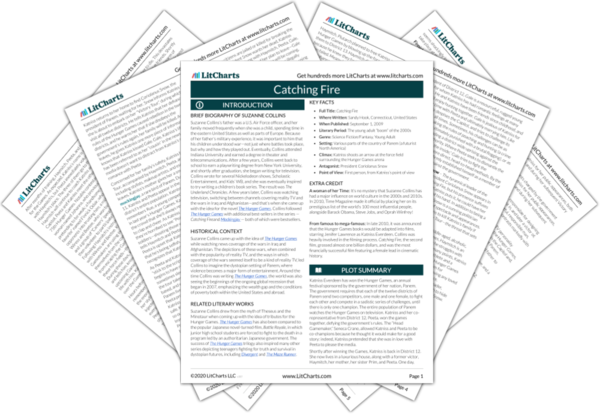A tyrannical government, headed by President Snow, controls the nation of Panem. While this government has a huge amount of physical power over Panem, one of the most important aspects of its power is its ability to run surveillance on its citizens, or—just as powerful—imply that its citizens are under constant surveillance, and thus manipulate their behavior.
At the beginning of Catching Fire, President Snow tells Katniss that he’ll be watching her to make sure that she “behaves” during her tour of the twelve districts of Panem, rather than trying to start a rebellion against the government. The fact that Katniss believes him so readily indicates just how extensive the government’s surveillance of its citizens is: it taps their phones, installs secret cameras in their houses, and sometimes makes them compete in the Hunger Games, filmed by a TV crew at all times. In short, Katniss’s society is one in which the people are under near-constant surveillance, especially if they’ve been judged by the government to be “dangerous.” (In this sense, Panem it must be said, bears an uncanny resemblance to many real-world countries, including the United States.) This leads us to ask a number of questions. What does it mean to be watched at all times? How does it influence one’s sense of safety, or one’s interactions with others?
To begin with, the threat of constant surveillance makes people censor their own behavior and act more cautiously. At many points, Katniss makes her speech milder and less politically charged because she guesses that the government is tapping her phone. This is, of course, what President Snow wants. Nevertheless, there are several times in the book when Katniss seems to forget that she’s being watched. During her Victory Tour, she describes herself forgetting that her relationship with Peeta, the Hunger Games’ co-champion, is all for show—she thinks that she feels genuine love and affection for him. This suggests that the government’s surveillance and spying is so pervasive that it becomes a part of people’s lives—their cautious, self-censored behavior becomes, simply, their behavior. A third effect of government surveillance is that it encourages people to place greater value on privacy and intimacy. When she’s sure that they’re alone, Katniss savors her interactions with Gale, because she knows how rare these moments are. Thus, even the most banal of conversations with Gale becomes special.
Surveillance is a recurring theme in all three volumes of the Hunger Games, and because Catching Fire is only the middle book in the trilogy, Collins doesn’t resolve this theme altogether. The book ends with Katniss, knowing full well that all of Panem is watching her, openly defying the government’s authority by shooting at the force field that imprisons her in the Hunger Games. Collins suggests that one cannot merely accept or adapt to constant surveillance, as some of the characters (including Katniss) appear to do. Instead, the best course of action would seem to be, “Be yourself.” And yet immediately after this, Collins reveals her “twist ending”—all along, Katniss has been manipulated by a group of rebels, including her mentor, Haymitch Abernathy, into defying the government. Is it really possible to “be yourself,” Collins seems to ask, if you don’t know who your friends are? On this uncertain note, Collins moves on to Mockingjay.
Surveillance and Manipulation ThemeTracker

Surveillance and Manipulation Quotes in Catching Fire
Did I do it? Was it enough? Was giving everything over to you, keeping up the game, promising to marry Peeta enough?
In answer, he gives an almost imperceptible shake of his head.

Unlock explanations and citation info for this and every other Catching Fire quote.
Plus so much more...
Get LitCharts A+There was something strange about it. Almost clandestine. But why? Maybe he thinks someone else will steal his idea of putting a disappearing mockingjay on a watch face. Yes, he probably paid a fortune for it, and now he can’t show it to anyone, because he’s afraid someone will make a cheap, knockoff version. Only in the Capitol.
But then the axe fell. Peacekeepers began to arrive by the thousands. Hovercrafts bombed the rebel strongholds into ashes. In the utter chaos that followed, it was all people could do to make it back to their homes alive.
I thought no one saw me sneak under the fence, but who knows? There are always eyes for hire. Someone reported Gale kissing me in that very spot. Still, that was in daylight and before I was more careful about my behavior. Could there be surveillance cameras?
[Gale] must also know that if we don’t revolt in 12, I’m destined to be Peeta’s bride. Seeing me lounging around in gorgeous gowns on his television… what can he do with that?
One way or the other, I have a very valuable piece of information. And if they know I have it, they might do something to alter the force field so I can’t see the aberration anymore. So I lie.
I stare into the night, thinking of what a difference a day makes. How yesterday morning, Finnick was on my kill list, and now I’m willing to sleep with him as my guard. He saved Peeta and let Mags die and I don’t know why.
There are six of us now. Even if you count Beetee and Wiress out, we’ve got four good fighters. It’s so different from where I was last year at this point, doing everything on my own. Yes, it’s great to have allies as long as you can ignore the thought that you’ll have to kill them.
My mouth drops open in shock. No one, ever, says anything like this in the Games. Absolutely, they’ve cut away from Johanna, are editing her out. But I have heard her and can never think about her again in the same way. She’ll never win any awards for kindness, but she certainly is gutsy. Or crazy.











